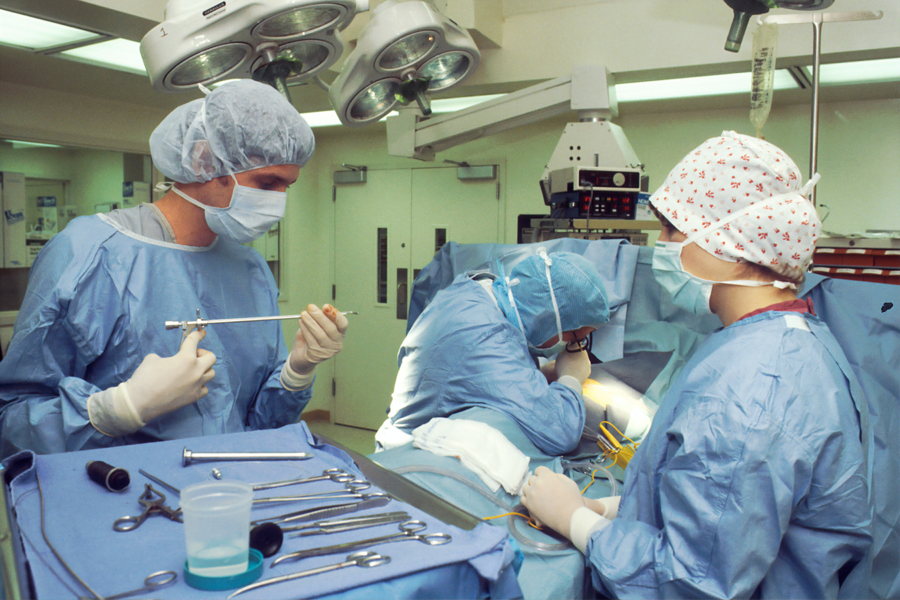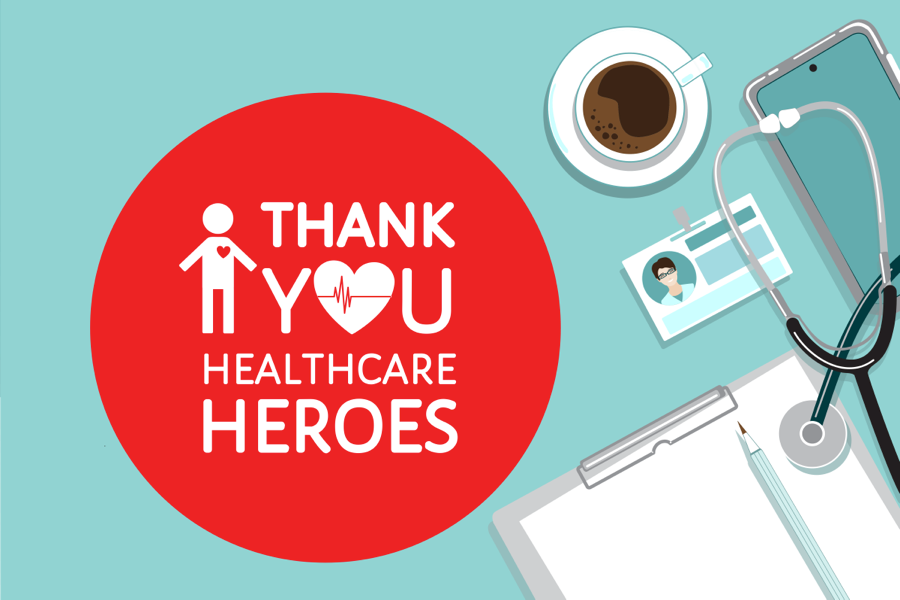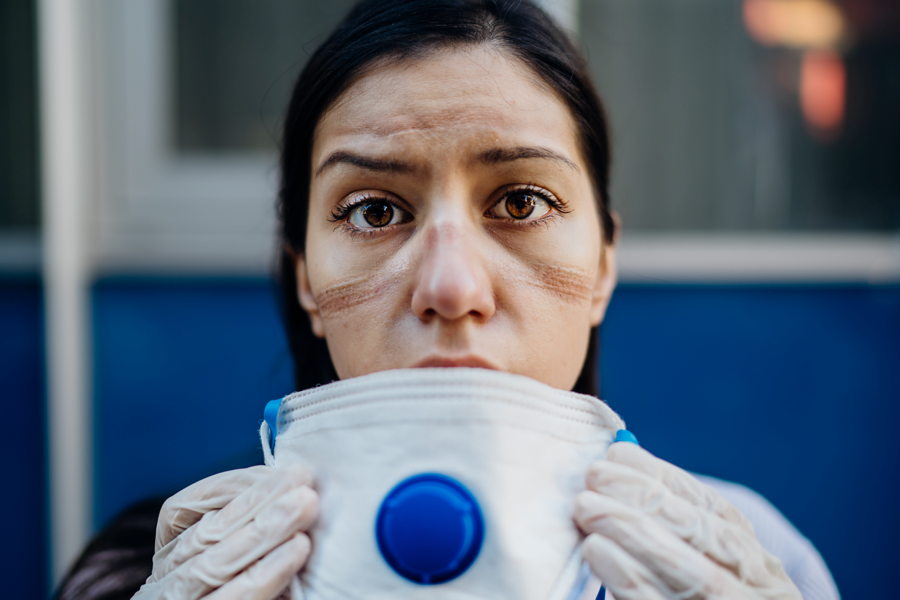
TIPS, ADVICE, & INSPIRATION
When the Nurse Becomes the Patient
-
 EveryNurse Staff
EveryNurse Staff
- Last Updated: 02/26/2020

In the winter of 2011, around Christmas, I began feeling ill. Before I knew it, I was so sick that I was disoriented, not realizing the perilous situation that I was in. After having no contact from me for several days, my parents came to my home to check on me and realized something was very, very wrong. I was gasping like a fish out of water, unable to breathe. I felt like I was drowning.
My parents quickly loaded me up into the car and rushed me to the hospital. When we arrived, even though I was in active respiratory failure, I was forced to wait in the waiting room for three hours, sitting in a wheelchair. At this point, I was hours away from respiratory arrest.
Once I was finally triaged, I was immediately intubated and rushed off to the ICU. I can’t remember these details, of course, they’ve all been relayed to me by my family, who had accompanied me to the hospital. I was diagnosed with MRSA pneumonia in both lungs. This is only the beginning of the story.
Dreams, Hallucinations, and Regret
I was so severely ill that the doctors put me into a medically-induced coma, in hopes of relieving the stress on my body and keeping me from extubating myself. I was, without intention, a very combative patient. I bit the end of my tongue off while trying to chew through the tube, as I was still orally intubated. I succeeded and had to be reintubated. This was to happen another time before the doctors could install my tracheostomy. It would be three weeks before I was stable enough to perform the procedure. My left lung collapsed, weakened by the severe infection in it. I can vividly recall someone jumping on top of me, holding me down, and “stabbing” me. I didn’t realize what was really going on. No nursing experience could have spared me from that.
This was one of the most terrifying experiences that I have ever encountered. In my drug-induced “new world” I had just been attacked, and it set the stage for a host of post-ICU neuroses, including PTSD, severe panic attacks, and a rabid phobia of hospitals and doctors that is so strong I fear that I would die before going to a hospital again.
While in the medically-induced coma, reality blurred with fantasy, and I’m not sure how one would classify it, dreams, maybe? Hallucinations? I found myself in a world where my son went to the Iraq war and came home maimed, and my mother was killed by a tainted drug. My other son was dead. My daughter was fourteen, and to this day, I still can feel the worry and regret that I felt. I hadn’t prepared for someone to take care of her. Instinctively, I must have known that I was dying. Those regrets that I felt in that state still remain with me to this day. I remember the events that I perceived during my sedation as if they really happened to me. I still have memories of things that never happened.
Every two hours during the day I would hear the loudspeaker say “viewing hours are now open.” In my drug-riddled stated, I thought it was my wake, with people filing down the hallway to come and “view” me. To this day I will tell you that I do not want any wake, funeral, or even a memorial service. This part of my ordeal severely scarred me, and years later, I wasn’t even able to go to my grandmother’s funeral. The grandmother I had loved so deeply and had cared for, in my home until her death. Irrational as it seems, my dreams and hallucinations crept into reality and made a place for themselves, still affecting me. I’m not sure they will ever stop. I can remember the sound of the ventilator alarm. It blurted out what I heard, in my far-away state, as the word “Figford, Figford.” That sounds odd, but my mind had converted the sound to a word. At one point in my “dream,” I asked my son how I could fix all of my many mistakes. He looked at me, then sat down at an old, grainy computer and pulled up a screen. “All you have to do to get rid of your mistakes, Mom, is a “Figford delete.” He then went down the row of my many mistakes, deleting them one by one with a smile on his face.
I heard or perceived that word so frequently while I was in a coma that I searched it upon my release from the hospital, feeling confident that I’d heard that word somewhere before I was sick. I could find nothing of it.
Something Every Intensive Care Nurse Should Know
Having been an ICU nurse, as well as an ICU patient, has allowed me to voice a unique perspective on the subject. I remember awakening, for the first time, after my sedation had been reduced, when my kidneys had begun to function again after suffering an Acute Tubal Necrosis. The 55 lbs of water that had accumulated in my body began to be released, by way of the drug Lasix, and I was becoming stable again.
I still had one horrible battle ahead of me, and in all honesty, this battle is the reason for my story. After more than seven weeks on a ventilator, as an RN, I knew that my chances of weaning off of it were slim to none. It was my nursing knowledge of how to help wean a patient from a ventilator that enabled me to “nurse myself” and to do what I had to do to get back to the business of breathing on my own. No nurse stayed with me, even though ICU nurses only have two patients and if they have a severe case, then they have only one. There was no reason that a nurse shouldn’t have been there with me, as a cheerleader, comforter, and drillmaster, to encourage me that I could do it. Due to this reason, every day, the thought of weaning time became something to dread. Fortunately, I’m a fighter. Others may not be so fortunate to have that drive.
When the first day of weaning came, I was terrified. Part of my fear of weaning was due in significant part to the nursing care that I received. I would ring for the nurse, needing to get to the bedside chair because they had removed my catheter, but I wasn’t able, yet, to sit up in bed on my own, much less get to the bedside chair. There was more than one instance where I waited over 2 hours after calling for a nurse, but none came. I remember how I felt so humiliated when a resident came in to remove my three chest tubes. I had called for the nurse for over two hours, and finally, I couldn’t hold it anymore. I wet my bed. I rang again, and none came to change my bed. They left me in my own urine for another hour. That doctor sat down on the stool, sniffed, and looked at me in a way that I wasn’t able to comprehend. I felt like a puppy dog who had made a mistake.
As I began to get better and was released from the hospital to recuperate, I began to look back on my experience, as well as my career as a nurse. Had I been “That” nurse? The one who didn’t come when my patients rang. The one who left their patient to face mortifying circumstances alone. Had I judged my patients? I was relieved to come to the conclusion that I hadn’t. Had I shown them the love and compassion that drew me to the profession in the first place? I believe the answer to that question is yes.
Nurses, especially intensive care nurses, please take these words, not in a spirit of condemnation, but in the spirit of conveying the perspective of an RN turned MICU patient. If you have a patient who is heavily sedated, please understand, that hearing your calming voice on a regular basis, orienting a patient to their situation is worth more than any other action you can perform. Be at the ready; go to them when they need you. If a patient is fearful of being taken off of the ventilator, stay put, coach them through it, be a cheerleader. It is frightening, and physically challenging to wean from the ventilator. Patients need support during this period. And always remember, your patients, no matter how sedated, do perceive what is going on around them. It may be a skewed perception, but they are more aware than you know. Be the nurse who never lets them down.























